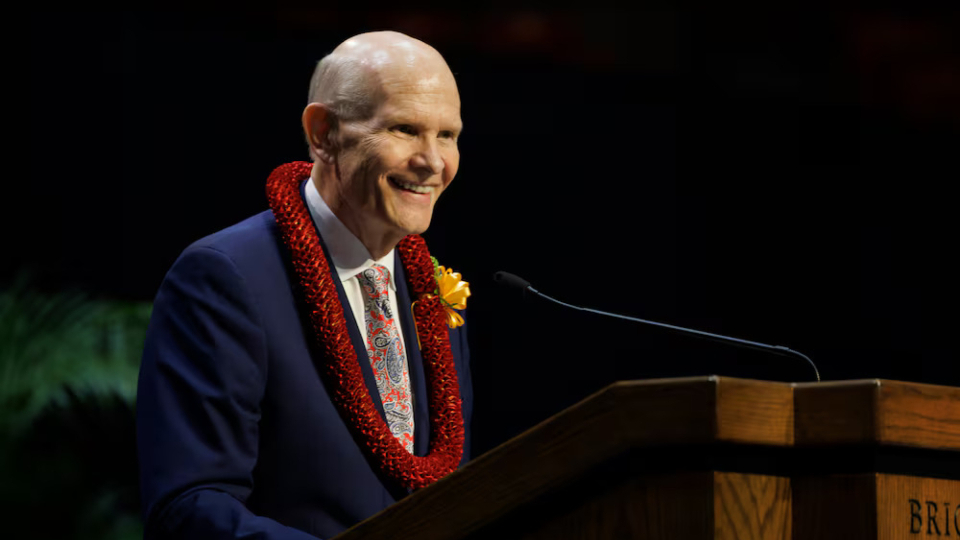
renlund-byu-hawaii-devotional-1.jpg
Elder Dale G. Renlund of the Quorum of the Twelve Apostles speaks during a devotional held in the Cannon Activities Center on the BYU–Hawaii campus in Laie, Hawaii, on Sunday, November 17, 2024. Photo by Kevin Tumaliuan, BYU–Hawaii, courtesy of Church News.All rights reserved.This story appears here courtesy of TheChurchNews.com. It is not for use by other media.
By Rachel Sterzer Gibson, Church News
Those who “willingly and wholeheartedly” take upon themselves the name of Jesus Christ will be blessed with greater power, stability and direction in their lives, promised Elder Dale G. Renlund of the Quorum of the Twelve Apostles during a devotional at Brigham Young University–Hawaii on Sunday evening, November 17.
Thousands gathered in the Cannon Activities Center in Laie, Hawaii, for the Apostle’s remarks. Elder Renlund was joined at the devotional by his wife, Ruth, who also spoke.
To illustrate the blessings of “taking Christ’s name upon us,” Elder Renlund shared the example of an academic surgeon who found a role model in President Russell M. Nelson.
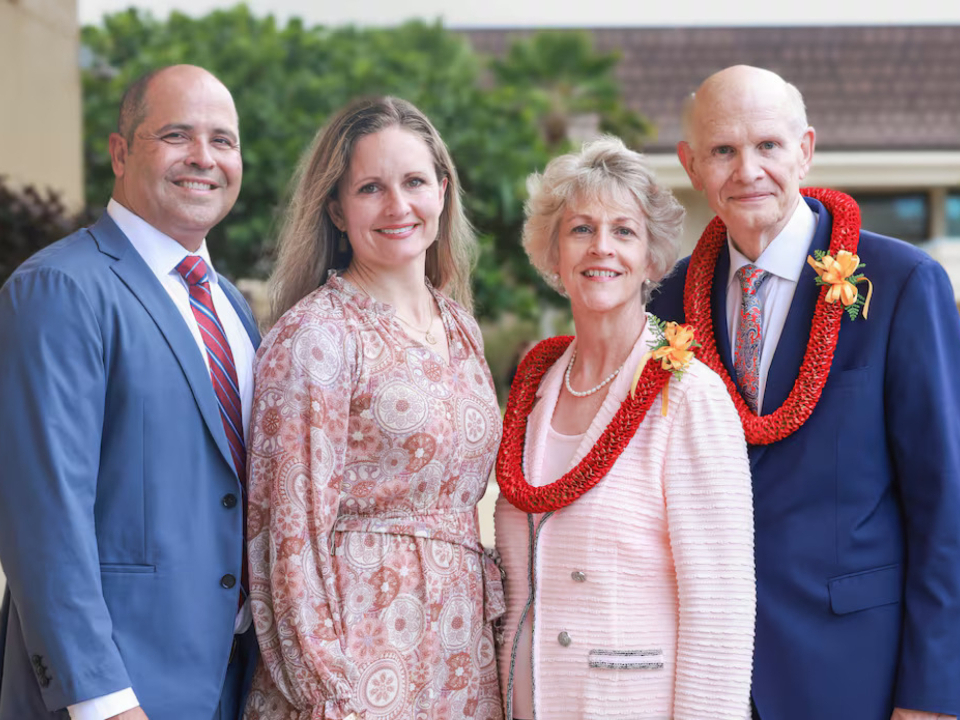
renlund-byu-hawaii-devotional-2.jpg
From left, BYU–Hawaii President John S.K. Kauwe III, Sister Monica Kauwe, Sister Ruth Renlund and Elder Dale G. Renlund of the Quorum of the Twelve Apostles pose for a photo prior to the Renlunds speaking in a devotional in the Cannon Activities Center in Laie, Hawaii, on Sunday, November 17, 2024. Photo by Douglas Ferreira, BYU–Hawaii, courtesy of Church News.All rights reserved.In 2018, President Nelson and his late wife, Dantzel, were honored by the University of Utah for years of work and support in the field of cardiothoracic surgery with a presidential endowed chair named in their honor.
Both Elder Renlund and his wife, who attended the investiture ceremony, were impressed by the experience shared by Dr. Craig Selzman, the first cardiothoracic surgeon selected to be the “Nelson chair,” Elder Renlund said.
Dr. Selzman, who is not a Latter-day Saint, shared how being appointed to this chair planted in him a desire to change his attitudes and behaviors and become more like President Nelson.
For example, earlier that week Dr. Selzman said he noticed that one of the patients he had operated on earlier was doing poorly and needed to go back to surgery. Normally, Dr. Selzman would have showered his frustrations at having to spend another long night at the hospital on his surgical team. He remembered, however, how Dr. Nelson was known as a gentleman, someone who always kept his emotions in check, treated everyone with dignity and respect, and never lost his temper. So Dr. Selzman composed himself and intentionally changed his attitude.
Elder Renlund then shared five aspects of the process of taking on the name of Jesus Christ that are illustrated in Dr. Selzman’s change: identification, capability, emulation, purpose and remembrance.
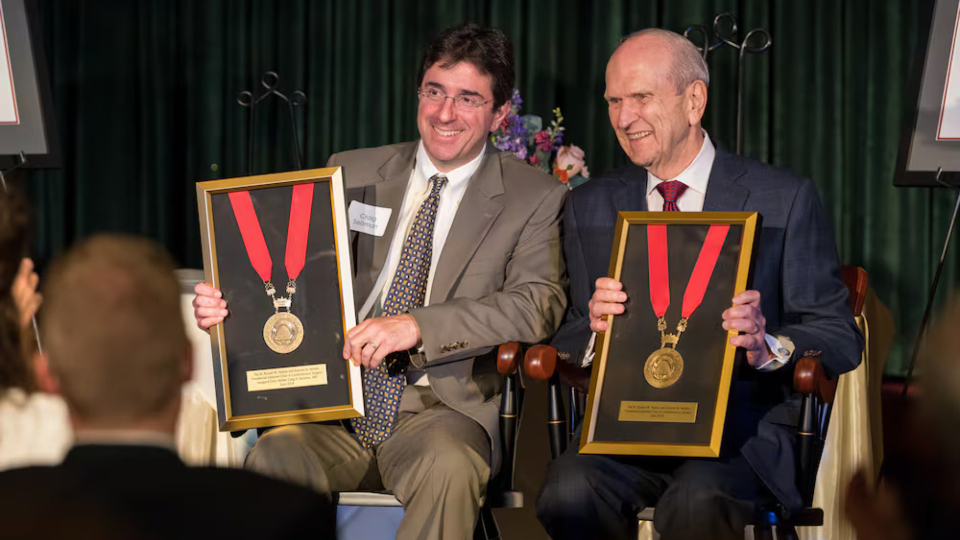
renlund-byu-hawaii-devotional-3.jpg
Dr. Craig H. Selzman, a heart surgery professor in the University of Utah’s School of Medicine, sits for a photo with President Russell M. Nelson. Dr. Selzman is the recipient of the Dr. Russell M. Nelson and Dantzel W. Nelson Presidential Endowed Chair in Cardiothoracic Surgery, which was announced on Friday, June 15, 2018.2024 by Intellectual Reserve, Inc. All rights reserved.Five Aspects in the Process of Taking Upon the Name of Christ
The first aspect is identification. When Dr. Selzman linked his name with President Nelson by being appointed to “the Nelson chair,” he identified with President Nelson.
“When we take on the name of Jesus Christ, we link our name with His. We identify with Him. We gladly become known as Christian,” said Elder Renlund, adding, “Metaphorically, the banner we carry and the jersey we wear identify ourselves with Him.”
The second element is capability. Linking his name to President Nelson provided Dr. Selzman with the resources and the capability to change the culture in his division.
When individuals link their names with the Savior, they get something even better, Elder Renlund said. President Nelson has taught, “The reward for keeping covenants with God is heavenly power — power that strengthens us to withstand our trials, temptations and heartaches better. This power eases our way” (“Overcome the World and Find Rest,” October 2022 general conference).
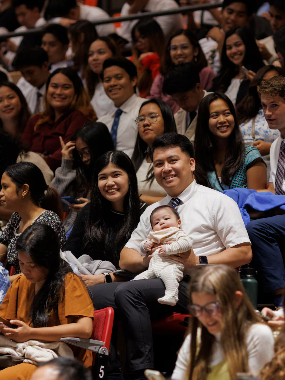
renlund-byu-hawaii-devotional-4.jpg
Students gather in the Cannon Activities Center on the BYU–Hawaii campus in Laie, Hawaii, on Sunday, November 17, 2024, to hear remarks be Elder Dale G. Renlund of the Quorum of the Twelve Apostles and his wife, Sister Ruth Renlund. Photo by Kevin Tumaliuan, BYU–Hawaii, courtesy of Church News.All rights reserved.The third aspect of the process is emulation, Elder Renlund continued. “When Dr. Selzman became the recipient of the ‘Nelson chair,’ he began to emulate President Nelson’s attributes. When we take on ourselves the name of Jesus Christ, we, too, have found our role model, and we strive to emulate Him. In this emulation, we strive to develop the attributes He has.”
The fourth element is accepting a common purpose. As a surgeon, Dr. Nelson had been a teacher, a healer and a researcher. Dr. Selzman joined in those endeavors in his role as “the Nelson chair.”
“When we take on ourselves the name of Jesus Christ, we willingly join the Savior in His work. … We join the Savior in His work when we share His gospel, when we minister to those who have been shattered or crushed by their experiences in mortality, and when we help the vulnerable,” Elder Renlund said.
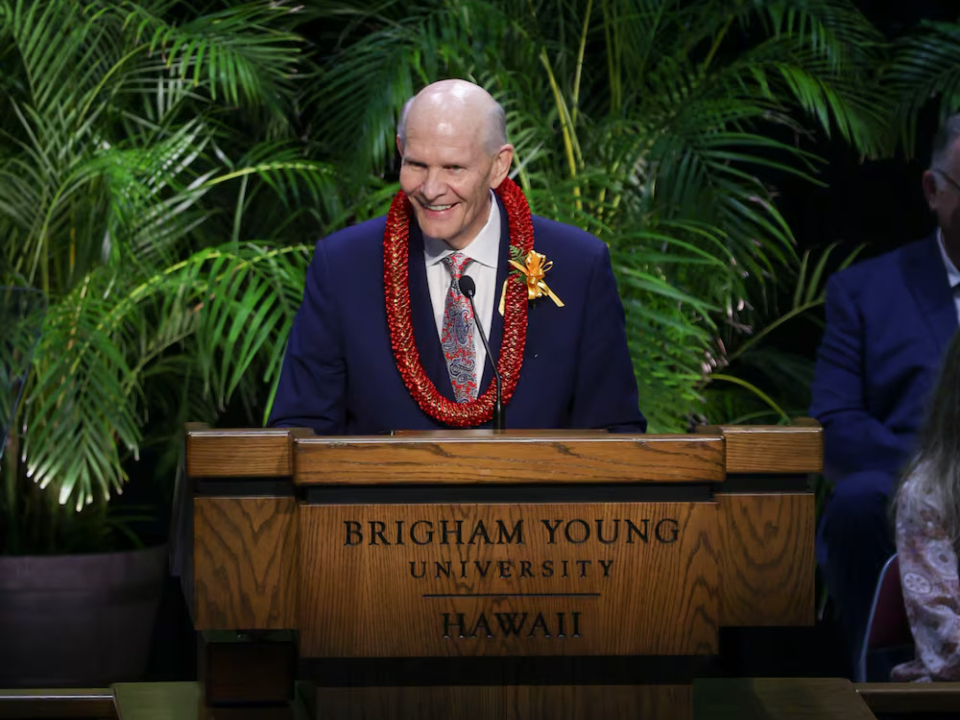
renlund-byu-hawaii-devotional-5.jpg
Elder Dale G. Renlund of the Quorum of the Twelve Apostles speaks in the Cannon Activities Center on the BYU–Hawaii campus in Laie, Hawaii, on Sunday, November 17, 2024. Photo by Douglas Ferreira, BYU–Hawaii, courtesy of Church News.All rights reserved.The last aspect of the process is remembrance. Dr. Selzman said that when he goes into his office, he sees the medallion he received at his investiture, which increases his resolve to strive to do better. “For us, as we partake of the sacrament, we covenant to always remember Jesus Christ,” Elder Renlund said.
What can individuals do to always remember? “Among the most important is preparing for and worthily partaking of the sacrament each week,” Elder Renlund said. Those who don’t “are built upon a sandy foundation; and when the rain descends, and the floods come, and the winds blow, and beat upon them, they shall fall’” (3 Nephi 18:13).
The prophet Mormon described his people when Christ was not involved in their lives as being “led about by Satan, even as a vessel is tossed upon the waves without sail or anchor, or without anything wherewith to steer her and even as she is so are they” (Mormon 5:18).
Being without a sail means they were without power, explained Elder Renlund. Being without an anchor means they didn’t have stability and being without anything to steer with means they had no direction.
In contrast, those who take upon themselves the name of Christ and come unto Him receive His power, stability and direction — even as they face metaphorical rain, wind or floods, Elder Renlund said.
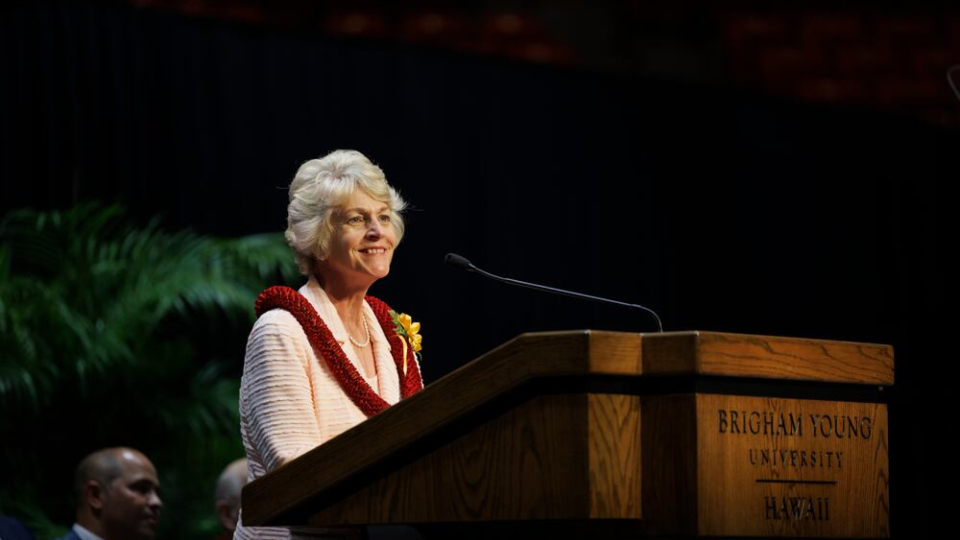
renlund-byu-hawaii-devotional-6.jpg
Sister Ruth Renlund speaks during a devotional in the Cannon Activities Center on BYU–Hawaii campus in Laie, Hawaii, on Sunday, November 17, 2024. Photo by Kevin Tumaliuan, BYU–Hawaii, courtesy of Church News.All rights reserved.Gaining Spiritual Knowledge
In her remarks, Sister Renlund encouraged listeners to gain and retain spiritual knowledge. “Just like gaining and retaining other knowledge, gaining spiritual knowledge requires work. It is a different kind of work but requires your time and attention.”
Sister Renlund said she fears too many give up on learning and understanding spiritual matters because they only attend class such as Sunday School but do no additional work to have their own spiritual experiences. “The work it requires is the same list of things you have always heard should be part of your righteous routine: study and ponder the scriptures, pray sincerely, keep God’s commandments and attend church to partake of the sacrament.”
Spiritual knowledge is more than mastering facts, Sister Renlund said. “It is knowing or believing that which comes through the confirmation of the Holy Ghost.”
Copyright 2024 Deseret News Publishing Company.